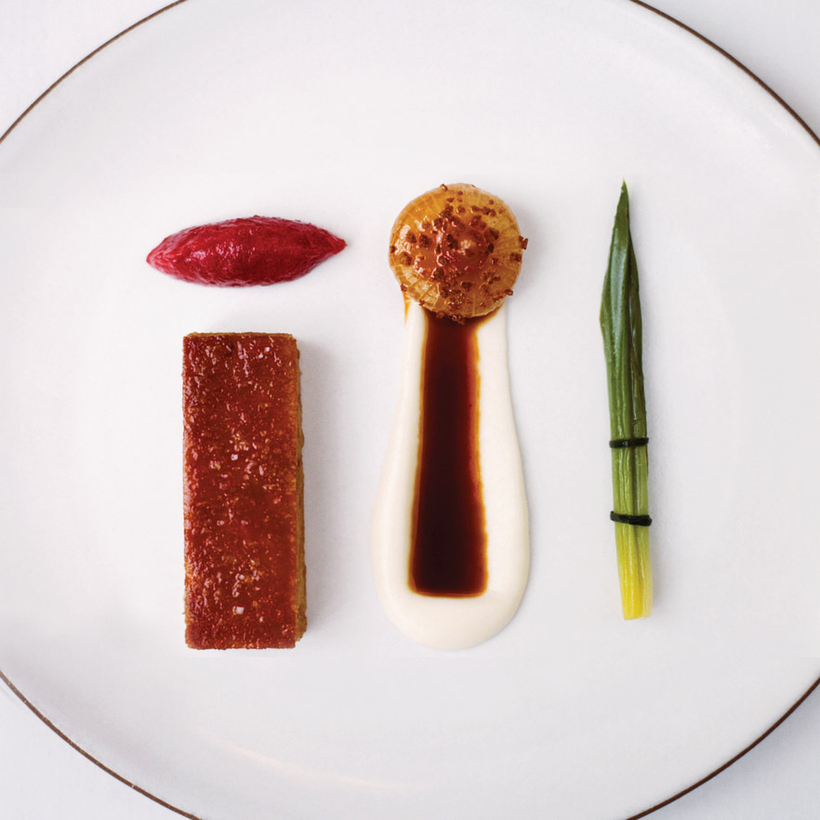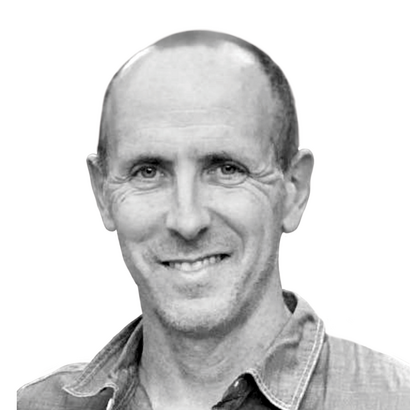I don’t think I’ve ever really stopped eating. I’m not saying that I struggle with my weight, because I don’t really. If I had to describe my physical composition at the moment, I’d say, “overcooked piece of penne rigate,” but as far as size goes I’m O.K. with where I am. I’m saying I am never not eating.
I come from a long line of noshers. My father, my grandfather, his grandfather before him in Poland. We like to snack. My wife says it’s “unconscious.” It’s like those people who eat plastic wrap or bed pillows when they’re on Ambien. Except I do it when I’m awake.
It’s probably some kind of addiction, like being an alcoholic. But since we’re Jews it’s not the gin-and-tonics, it’s the Fritos. But not just Fritos. It’s potato chips. Olives. Would I like some passed hors d’oeuvres? I’ll try one, every time you come by. How about this decorative bowl of peanuts that no one has touched in two weeks and isn’t technically edible? Why sure!
My father is the same way. Left long enough to our own devices, we will eventually snack on garnishes, cocktail napkins, dinette sets made of medium-density fiberboard.
And by now it’s pretty clear that never not eating is not great for your health. The science suggests not eating for long stretches of time can be very good for you. It decreases inflammation. It can reduce risk factors for many diseases such as diabetes and cancer. Calorie restriction is linked to longevity. It’s part of the reason not eating has become so popular and acceptable. Intermittent fasting, the Master Cleanse, juice fasts, water fasts … there are just so many well-branded ways people can not eat.
(The other reason fasting has become so popular could be that it masks disordered eating, which is not, unfortunately, a new thing.)
But none of this has ever been very convincing to me because there’s no getting around the fact that fasting involves not eating. Which just isn’t my thing. I would not have been a good biblical figure.
It’s like those people who eat plastic wrap or bed pillows when they’re on Ambien. Except I do it when I’m awake.
And then someone told me about a popular fast called ProLon. This person, an actor you would recognize from a series of commercials that have made him fantastically wealthy but also resentful that people don’t really take him seriously, had been diagnosed with cancer. His prognosis was good, but his oncologist recommended he do ProLon three or four times a year.
This was interesting because I am interested in not getting cancer. But also because ProLon is what’s known as “fast-mimicking.” Which means that for $170, ProLon will deliver a program that not only involves fasting but also eating. I decided to try it.

Day One
I’m excited! All of my problems are going to be solved. I already feel stronger. Cuter. My jeans are fitting pretty great. Maybe I’m wrong, but I think I already have, like, a lot less cancer. My psychosomatic glow-up has begun.
Like all life experiences in 2023, ProLon comes to you in the form of a giant box that’s delivered to your house by someone earning minimum wage, and is two-thirds packaging that you instantly throw away. Inside are five smaller white boxes the size of self-help books, labeled “1” through “5.” Each box contains all the food I will be allowed to eat for a single day.
I open the first one. It’s filled with a bunch of other, smaller white boxes and white foil packages and confusing instructions written in tiny print. ProLon is like eating a giant coronavirus test every day.
The food supposedly contains nutrients so you don’t harm your body while you’re restricting calories, plus some other ingredients that purportedly help you cleanse yourself. Milled pipe cleaners or something.
On today’s menu are two instant soups, a package containing about six kale crackers, another of precisely 7.4 pitted green olives, and two herbal teas. There’s other medical-adjacent stuff—a packet of pills labeled “NR-1” (sounds like a minor comet orbiting between Jupiter and Uranus) and a set of capsules containing something called algal oil (which I look up on the Internet and discover is extracted from algae and has omega fatty acids.)
I follow the instructions and take out something called an L-Bar. It’s mostly nuts. It tastes kind of … O.K.! This isn’t bad.
Day Two
This is terrible. This is a big mistake.
I am … hungry. Some days of a fast-mimicking fast are more like a fast and some are less. The first day was less like a fast: 1,150 calories. Today is more like one: 800 calories. I’m not sure I can make it five days. All I can think about is all the food that I’m not eating. Look at that Oreo in my cabinet that I’m not eating. Look at that person in the ad eating the Egg McMuffin and not even really thinking about it.
I have been marked by hunger (for 36 hours). I now carry with me a burden invisible to those around me but one that separates me from all of humanity. And I can say from the other side of that great divide: all those unconsciously eating an Egg McMuffin, know that you can’t possibly appreciate what you have until you lose your Egg McMuffin. It can’t get worse.
ProLon is like eating a giant coronavirus test every day.
But by afternoon, it’s worse! I feel like I have a low-grade flu. My wife, who is fast-mimicking with me, is in bed with a splitting headache. When you read the literature or talk to people who are dedicated to ProLon, they will tell you: That feeling is actually a good thing! This is just the toxins leaving your body, or maybe caffeine withdrawal.
But shouldn’t it feel good when toxins leave your body? Couldn’t there be another reason I feel bad? Maybe it’s because I’m starving myself? Like maybe it’s not the toxins leaving my body, it’s just my actual body leaving my body!
Day Three
On day one, I liked everything I was allowed to eat from my coronavirus test. Now I realize there is a clear hierarchy of ProLon food. The L-Bar nut thing for breakfast is O.K. The soups are terrible—there’s some kind of thickener in there that makes them both weightless and dense at the same time. It’s like eating a soup-flavored shaving cream with dehydrated peas that just won’t rehydrate no matter how long you cook them. But certain flavors are worse than others.
The only true thing is the packet of olives. The olives are my only link to the real, living world. I love the way they feel in my mouth.
By dinnertime—fuck, dinnertime!—I am walking around Madrid, where I was living at the time, having arguments with myself.
Why are you even doing this? Why would you torture yourself on purpose? It’s actually kind of sick. It’s self-harm.
And then: This isn’t going to accomplish anything. You’re fine. Maybe you physically feel like overcooked pasta. But you eat healthy. You’re good.
And then: Do you really believe in any of this bullshit? My grandfather lived to be 93 years old and he lived on lox and bagels, New York strip steaks, and one martini a week, plus a steady diet of every cocktail nut within a 40-mile radius. Look at that woman right there. She’s sitting at a lovely outdoor table eating a bocadillo do jamon and drinking a café con leche right before bed and nothing bad is happening to her.
Maybe this is just the deranged, rationalizing logic of the addict. Heroin’s actually the best thing in the world. Nothing else feels as good, so why would you deny yourself that feeling? No matter what it costs? Don’t you want to live a life of pleasure?
But there’s also something to the argument. How valuable is it to torture yourself? Do I really want to be one of those miserable people whose whole life is a kind of health-driven contest of the will? When’s the last time you wanted to have one of those people over for dinner?
I am so sick of not eating that I go to sleep at eight p.m. You’re not hungry when you’re asleep, after all. Normally this would be too early, but since I have no energy anyway my body relinquishes itself without resistance.
Day Four
Something breaks. I’m not hungry. I don’t have a headache.
Here’s the weird thing. The first three days, the coronavirus-test astronaut food was my lifeline. All I could do was think about my next foil packet. I would ritualize the soups even though they were slightly disgusting. Measuring the water, heating it, inhaling some of the minestrone dust as I opened the foil pouch, stirring it as it boiled and thickened like spray insulation, serving it to myself on a small tray. The food, after all, made this a fast-mimicking program rather than a straight-up not-eating program. It was my methadone.
But now, in the middle of day four, I can’t eat any of this stuff anymore. The kale crackers, their dry, bitter taste in my mouth as I chew and chew and chew, soaking all my saliva but refusing to break down. I will die with this cracker still in my mouth. All of it makes me want to vomit.
There’s an uncanny valley kind of quality to all of it. While my body was slow to realize it wasn’t actual food, now that it has, it’s rejecting it completely.
Day Five
Five days down. Who cares. I could do this forever. I might never need food again. Food is the Matrix. You have to escape from it. I can live on sunlight and oxygen. I’m a plant. I’m a great oak. I like the taste of ketosis in my mouth. I’m invincible.
Oh, God. I just stood up too fast. Now I might fall over and die. This is actually probably what it’s like to die. It’s not just a fast-mimicking diet, it’s a death-mimicking diet. It gives you just a hint of death by starvation!
I go to sleep at six p.m.
Day Six
It’s over. I wake up at five a.m. and realize I can eat a raspberry. I do. A raspberry. The taste of it. The earthiness of it. The flesh. The feel of a raspberry in your mouth. The aroma is overpowering. It’s like having sex after you’ve been in jail for five years, except that it’s been five days and all I’ve had to do is eat instant soup.
Is it worth all that to have that sensation of eating a raspberry like a sensualist alien who’s never had fruit? Maybe? A strong maybe.
Meanwhile, would you happen to have an hors d’oeuvre?
Devin Friedman is a Los Angeles–based writer




